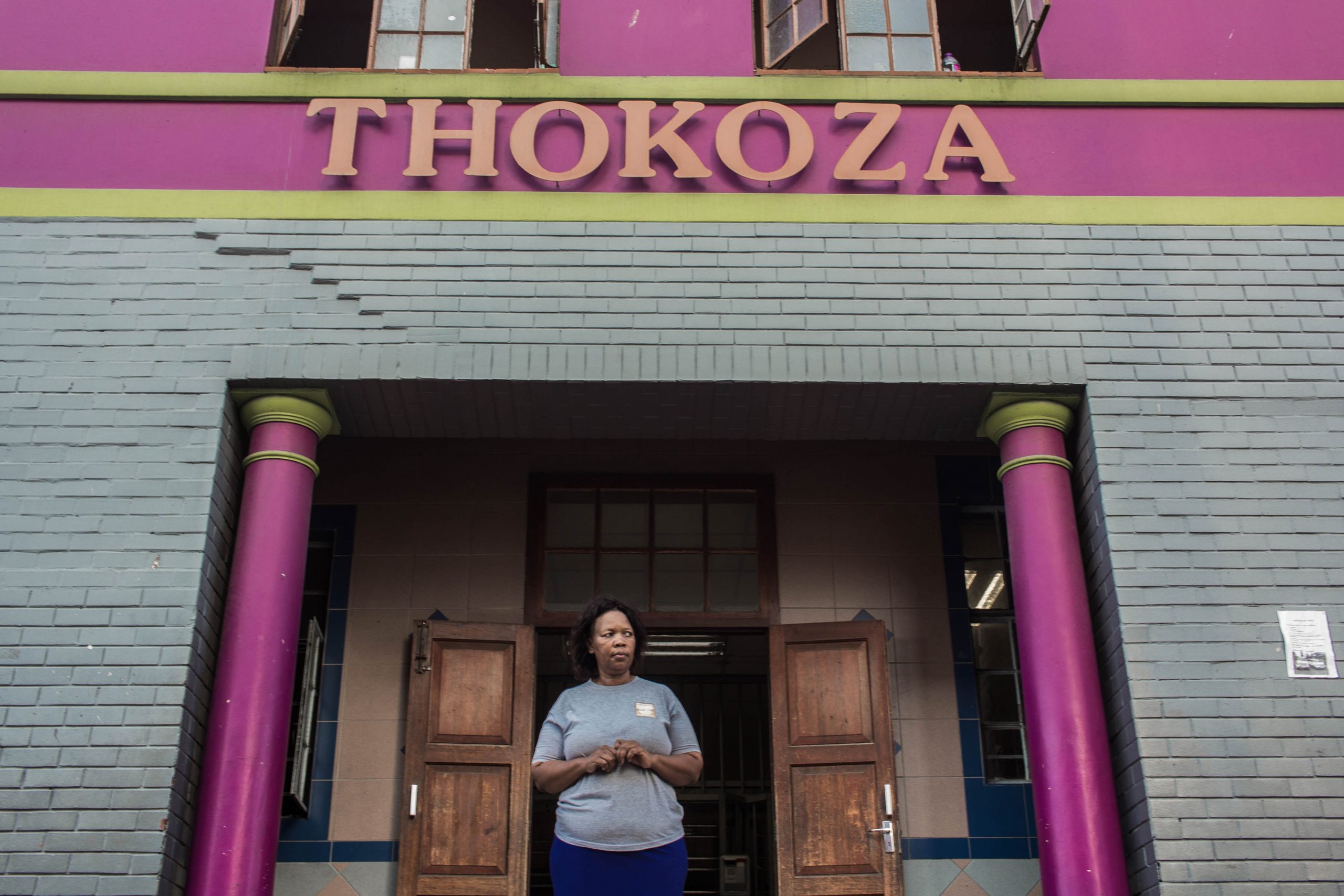Women’s hostel dwellers want housing
Residents at Thokoza Women’s Hostel, who earn a living through street trading, say better living conditions could improve their small businesses and keep their children safe.
Author:
1 April 2020

It is 5am in Durban at the Thokoza Women’s Hostel on Dr Yusuf Dadoo Street. Already, the turnstile gates spin continuously as women and children leave for the day. Many more hostel residents are milling around the dormitories, bathrooms and kitchens. The morning is bustling.
“Everyone is busy here. We have no time to waste,” shouts Thandiwe Khathi, 62.
Khathi calls herself the “Zulu chef”. Her speciality is pap and spinach, sometimes mixed with other leafy vegetables and pickled carrots, served as a salad. Khathi uses one of the communal kitchens in the four-storey hostel. Her daily routine begins at 4am. She salts the greens after allowing them to steam and simmer over the fried onions. By 5.30am, two of her pots are already boiling. Later she empties both the pap and greens into separate 10-litre buckets and prepares to leave.
“I pride myself in what I do. I use my upbringing and knowledge of indigenous healthy living methods as my frame of reference. I’ve always known that a plant-based diet is the best. My customers have been loyal to me, that’s why I wake up every day because it’s all worth it,” says Khathi.
For the past 30 years, Khathi has sold meals at the nearby taxi ranks and shops. She is one of many women in the hostel generating an income for their families.

Avoiding criminals and the police
“I leave at 10am. My first stop is usually the long-distance taxi rank nearby. [Customers] usually buy my R20 plates, others … around the city prefer the smaller plates of R15. I carry three 10-litre buckets. I dish for my clients onsite and by 2pm, the food is all finished.
“It is not easy or safe for a woman in the city streets, whether you are selling food, clothes or fruits. We walk long distances with heavy buckets and money. We often hide our goods when we see [danger]. We dodge … thieves regularly. The metro police threaten our livelihoods as female street traders. Without a permit, you are a constant target. This job is not for the faint-hearted ngane yami [my child],” Khathi says.
As the morning continues, many more women take turns in the kitchen. They are in “uniform”: a pinafore with long-sleeve blouses and long socks or stockings. They apply ibovu or red clay to their faces to prevent sunburn.
Related article:
Duduzile Cebekhulu, 56, has been selling peanuts and beaded accessories for 30 years. She sells her peanuts roasted, boiled or raw. She takes a bus to Clairwood in the south of Durban where she sells the peanuts to factory workers. Upon her return, she works on her unfinished beadwork for a reed-dance ceremony.
Both Cebekhulu and Khathi say that through street trading, they have been able to build their family homes and send some of their children to university.
But the worst features of migratory labour are still apparent at the hostels. The compact and cramped rooms house three beds, lockers, TVs and even refrigerators. They are densely populated, with 1 030 “official” residents and a further 450 “unofficial” ones. The number of children living inside the hostel is unknown to the municipality.
Creating a child-friendly place
Beadwork remains a powerful craft at the women’s hostel, with deep historical, religious and traditional histories.
Busi Msomi, 57, has been a resident for 26 years. She left her home, Folweni, a rural community south of Durban, in 1988 to find work in the city, which led her into beadwork. Many of her customers are Nazareth church women and members of the reed-dance ceremonies. She is busy working on inkehli – a headdress, following a unique pattern in each piece of work.

She says the growing number of children at the women’s hostel has created “chaos” with both boys and girls now “allowed” to stay at the women’s hostel.
“Life inside a hostel is not normal. It’s hard enough on adults. We have been here for decades, and it still feels strange being a grown woman cramped inside [with] two more women. This is no place for children. A hostel is not a home. It is meant to serve as a temporary shelter near the city.
“We cook under our beds and have no privacy. The living conditions have worsened, as more children – male and female – spread across the hostel. What will become of these children? For as long as children are still in school, the law says they can stay with their parents. Many women find themselves forced to share a room with a mother and her children, up to 18 years. A taboo that has become a norm in these dormitories,” explains Msomi.
Related article:
But Nonhlanhla Ngwane, a committee member for the hostel dweller’s movement Ubunye Bamahostela, says that allowing women with children to stay at the women’s hostel is necessary.
“I’ve lived 31 years in this hostel, and when you are a mother who makes ends meet, the usual context of a family does not exist. For a long time, we lived in separation with our children. We could no longer watch them suffer, some of them were experiencing sexual abuse and we could not protect them. So, together with 26 other women, we lobbied for the right to stay with our children. Talks and promises of family units seem to be a distant reality. We have since grown old living here.
“My mother lived and aged here, and I soon took her place. Now I live with my daughter who has since completed school,” says Ngwane.
The hostel’s superintendent, Siyabonga Mkhize, says plans to transform the hostels into family units that will mainly be allocated to the current hostel tenants are under way, with eThekwini Municipality in the final process of locating a suitable site for the units.
Related article:
On Day 5 of the nation-wide lockdown to help curb the spread of Covid-19, a charity organisation along with the shack dwellers movement, Abahlali BaseMjondolo, provided the Thokoza Women’s Hostel dwellers with care packages. These included soap and food parcels.
Nonhlanhla Ngwane, said that the women’s livelihoods have been disrupted during the lockdown – with no income from street trading:
“The lockdown is necessary, and although it has compromised our survival because we are unable to go out and make money we will wait and see what will happen. At this point, all we can do is use the last bit of money we’ve had to buy food and sanitisers. It is especially scary for us because already we are cramped in one room with our children and other families.
“As a result, an increased rate of bed bugs has been reported around the hostel. This highlights the plight of our conditions. It is impossible at this point to practice social distancing. We need more health measures implemented at the hostel before this worsens,” added Ngwane.



